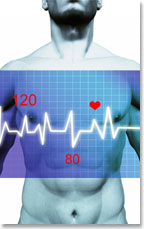 Garfield G. Duncan was a physician who began researching diabetes in the 1920s, and then nutrition in the 1940s. By the 1960s, Duncan was a professor of medicine at the University of Pennsylvania, where he began researching obesity. Duncan routinely fasted his obese patients, noting vital statistics, such as blood pressure, and what percentage regained the weight that was lost during the fast. In his case studies, he noted that patients who were hypertensive experienced a significant decrease in blood pressure during fasting, often dropping to within normal limits.
Garfield G. Duncan was a physician who began researching diabetes in the 1920s, and then nutrition in the 1940s. By the 1960s, Duncan was a professor of medicine at the University of Pennsylvania, where he began researching obesity. Duncan routinely fasted his obese patients, noting vital statistics, such as blood pressure, and what percentage regained the weight that was lost during the fast. In his case studies, he noted that patients who were hypertensive experienced a significant decrease in blood pressure during fasting, often dropping to within normal limits.
For decades, other doctors noticed a drop in blood pressure in patients during water-only fasting. However, it was not until the early 2000s that a study of significant magnitude was conducted demonstrating the effects of water-only fasting on hypertension.
In 2001, a team of researchers in Northern California conducted as 12-year study, during which they monitored 174 consecutive patients who were diagnosed with mild to severe high blood pressure. These patients were placed on a medically-supervised, water-only fast. The study, funded in part by a grant from the National Health Association, discovered that by having patients fast, blood pressures rapidly normalized. A number of patients who started fasting while on antihypertensive drugs had to discontinue their medication in fear that their blood pressure would drop too low. At the termination of the fast, 154 of the patients were normotensive.
The treatment protocol included an average water-only fasting period of 10.6 days, followed by a supervised refeeding period of one week with a low-fat, low-sodium, vegan diet. The average reduction at the conclusion of treatment was 46 points systolic and 15 points diasystolic and the average exit blood pressure was 128 points systolic and 78 points diasystolic without the use of any medication.
In a second hypertension study, 68 hypertensive patients were placed on water-only fasts for 4 to 40 days. Descriptive statistics, including standard deviations for the outcome variables of interest, were computed at three relevant time points. By the end of the fast, 82% of patients had a significant reduction in blood pressure. The final mean achieved (109/71) was similar to levels considered to be consistent with excellent health.